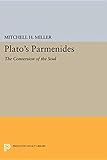Plato's PARMENIDES : The Conversion of the Soul / Mitchell H. Miller.
Material type: TextSeries: Princeton Legacy Library ; 5026Publisher: Princeton, NJ : Princeton University Press, [2017]Copyright date: ©1986Description: 1 online resource (314 p.)Content type:
TextSeries: Princeton Legacy Library ; 5026Publisher: Princeton, NJ : Princeton University Press, [2017]Copyright date: ©1986Description: 1 online resource (314 p.)Content type: - 9781400885893
- Reasoning
- PHILOSOPHY / History & Surveys / Ancient & Classical
- Absurdity
- Allegory of the Cave
- Ambiguity
- Analogy of the sun
- Anaxagoras
- Antinomy
- Antipathy
- Aporia
- Calculation
- Causality
- Cebes
- Concept
- Conceptual character
- Conceptualism
- Conflation
- Consciousness
- Contingency (philosophy)
- Contradictio in terminis
- Contradiction
- Contraposition
- Critias (dialogue)
- Critical thinking
- Criticism
- Deductive reasoning
- Diairesis
- Dialectic
- Diction
- Direct proof
- Disposition
- Equanimity
- Equivocation
- Euthyphro (prophet)
- Existence
- Explication
- Fallacy
- Glaucon
- Hippias Minor
- Hoi polloi
- Hypocrisy
- Hypothesis
- Idealism
- Identity (philosophy)
- Immanence
- Inference
- Infinite regress
- Intellectual history
- Intelligibility (philosophy)
- Ipso facto
- Irony
- Leveling (philosophy)
- Literal translation
- Menexenus (dialogue)
- Metaphor
- Mimesis
- Monism
- Multitude
- Mutatis mutandis
- Mutual exclusion
- Neoplatonism
- New Thought
- Nonsense
- Ontology
- Paradox
- Parmenides (dialogue)
- Parmenides
- Philosopher
- Philosophy
- Phronesis
- Plato
- Platonic realism
- Platonism
- Polemic
- Pre-Socratic philosophy
- Precedent
- Precognition
- Premise
- Pretext
- Principle of individuation
- Reality
- Reason
- Reductio ad absurdum
- Regress argument
- Rhetorical question
- Seventh Letter
- Socratic method
- Sophist
- Suggestion
- Søren Kierkegaard
- Tautology (rhetoric)
- Temporality
- The Philosopher
- Theaetetus (dialogue)
- Theory of Forms
- Theory
- Third man argument
- Thought
- Timaeus (dialogue)
- Universality (philosophy)
- Western esotericism
- Zeno's paradoxes
- 184 23
- B378 .M55 2017eb
- online - DeGruyter
| Item type | Current library | Call number | URL | Status | Notes | Barcode | |
|---|---|---|---|---|---|---|---|
 eBook
eBook
|
Biblioteca "Angelicum" Pont. Univ. S.Tommaso d'Aquino Nuvola online | online - DeGruyter (Browse shelf(Opens below)) | Online access | Not for loan (Accesso limitato) | Accesso per gli utenti autorizzati / Access for authorized users | (dgr)9781400885893 |
Frontmatter -- Analytical Table of Contents -- Acknowledgments -- Introduction: Interpreting the Parmenides -- Part One. Preparing to Rethink the Theory of Forms -- Chapter I. The Dramatic Context -- Chapter II. Parmenides′ Challenge to Socrates -- Part Two. “A Host Of Very Remote Arguments” -- Chapter III. Parmenides′ Help -- Chapter IV. Hypotheses I, II, and IIa: Form, the Participant Thing, and Their Relation (137c–157b) -- Chapter V. Hypotheses III—VIII: The Explication of I-IIa (157b–166b) -- Epilogue. Connections and Possibilities -- Appendix A: Structural Outline of the Parmenides -- Appendix B: Stages in the Process of Conversion from Things to Forms -- Notes -- Works Cited -- Index -- Index of Passages Cited
restricted access online access with authorization star
http://purl.org/coar/access_right/c_16ec
Miller's study demonstrates the value of integrating hermeneutic reading and conceptual analysis. His interpretation works out in detail the purpose and argument of the Parmenides as a whole and provides a new point of departure for discussion of its place in the Platonic corpus.Originally published in 1986.The Princeton Legacy Library uses the latest print-on-demand technology to again make available previously out-of-print books from the distinguished backlist of Princeton University Press. These editions preserve the original texts of these important books while presenting them in durable paperback and hardcover editions. The goal of the Princeton Legacy Library is to vastly increase access to the rich scholarly heritage found in the thousands of books published by Princeton University Press since its founding in 1905.
Mode of access: Internet via World Wide Web.
In English.
Description based on online resource; title from PDF title page (publisher's Web site, viewed 27. Jan 2023)


